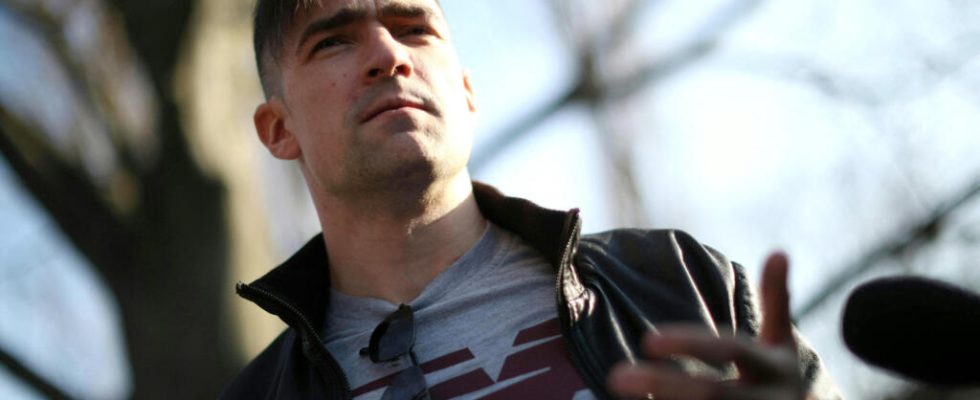Germans are mobilizing against the far right, after the revelation of the holding of a meeting of extremists in Potsdam, in which members of the Alternative for Germany (AfD) participated. Among the hosts: the Austrian Martin Sellner who came to present his “remigration concept”, a project for the mass expulsion of foreign people. Co-founder of the Austrian Identity Movement, he became an influential figure on the German-speaking radical right.
Martin Sellner looks like a hipster: stylish haircut, locks falling to the right, often smiling and always impeccable, whether he’s clean-shaven or sporting a three-day beard. Son of a homeopathic doctor and an English teacher, who grew up in the suburbs of Vienna, the 35-year-old holds a degree in philosophy and has not completed his law studies, according to THE Spiegel. “ He represents this new generation of far-right activists who presents well. We are very far from the classic image of the far-right activist, with a shaved head, sporting tattoos, a leather bomber jacket and the swastika, tattooed on the arm », notes Gilles Ivaldi, CNRS research fellow at CEVIPOF, specialists in radical right parties.
Martin Sellner gives the image of a young European, polyglot, very classic. He is married to Brittanny Pettibone, a Californian blogger, muse of the American alternative right, who has 175,000 subscribers on her YouTube channel. With his young wife, always well made-up and perfectly coiffed, he is the rather pleasant face of the identity movement. In his way of being, “ it participates in the strategy of the extreme right which advances more and more masked, which tries to hide as much as possible all the markers and symbols of the traditional extreme right », Estimates Gilles Ivaldi.
Identity generation
In 2016, in an interview with CNNin very good English, Martin Sellner introduced himself in 2016 as “ patriot and not neo-Nazi “. “ As a patriotic activist, author and journalist, I stand for truth and resistance, theory and action », he announces on his website.
However, he was involved with this movement from a very young age, recalls Jérôme Segal, Franco-Austrian essayist and historian: “ he was quickly attracted to the neo-Nazi milieu. He is close to famous Austrian neo-Nazi Gottfried Küssel. Already at the age of 17, he stuck swastikas on a synagogue. He is sentenced to 100 hours of community service », Lists the lecturer at Sorbonne University and specialist in the far right in Vienna.
Inspired by the French branch of Génération Identitaire, dissolved in 2021, accused by the government of provocations to hatred and discrimination, he co-founded the Austrian branch of the movement. Invited to the summer school for young French identity activists, he confided in a filmed interview that he found “ a great inspiration “.
Links to Christchurch killer
Fighting against immigration, Islamization and globalization, Martin Sellner is worried about the “great replacement” caused by Muslims in Europe. This concept, developed in France by the writer and philosopher Renaud Camus, was taken up by the killer of Christchurch, New Zealand, in 2019. Before murdering 51 people in two mosques, Brenton Tarrant had maintained a correspondence with Martin Sellner and he had made a donation of 1,500 euros, which had caused him to be worried by the Austrian justice system for “ participation in a terrorist organization “. The investigation was closed in 2021. Today, the Austrian extremist activist is banned from staying in the United Kingdom and the United States for reasons of public security. Germany has been considering doing the same since the Potsdam meeting.
The Austrian identity movement today has only a handful of members, “ their number is estimated between 500 and 600 », specifies Jérôme Segal. But Martin Sellner enjoys an audience on social networks, even if he has been banned from major platforms such as YouTube, Facebook, X or Spotify. On Telegram, he currently has 58,000 subscribers on his German channel and 2,000 on the English channel. He especially cultivates links with the Austrian far-right party FPÖ and with the German AfD. “ This small far-right galaxy on the Internet is influential in the sense that it infuses and gives ideas and themes to parties which are influential and which are at the forefront of the scene. », underlines Gilles Ivaldi.
According to one study by the ECFR think tank (European Council for External Relations), “ anti-EU populist right-wing parties will come out on top in at least nine EU member states » in June’s European elections, including France, Austria, Belgium, Italy and the Netherlands. For the legislative elections in September 2024, the Austrian FPÖ is credited with 30% of voting intentions.
